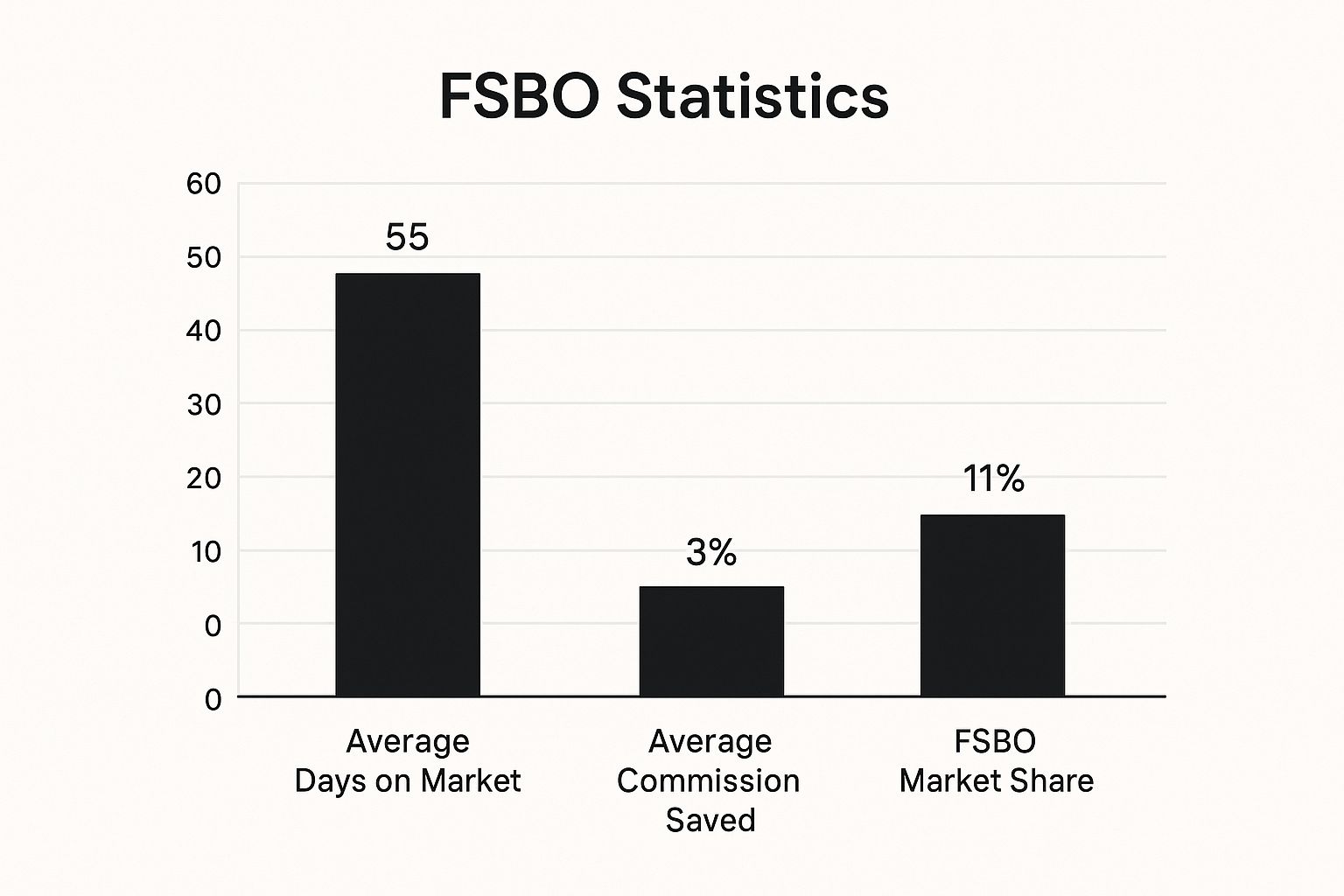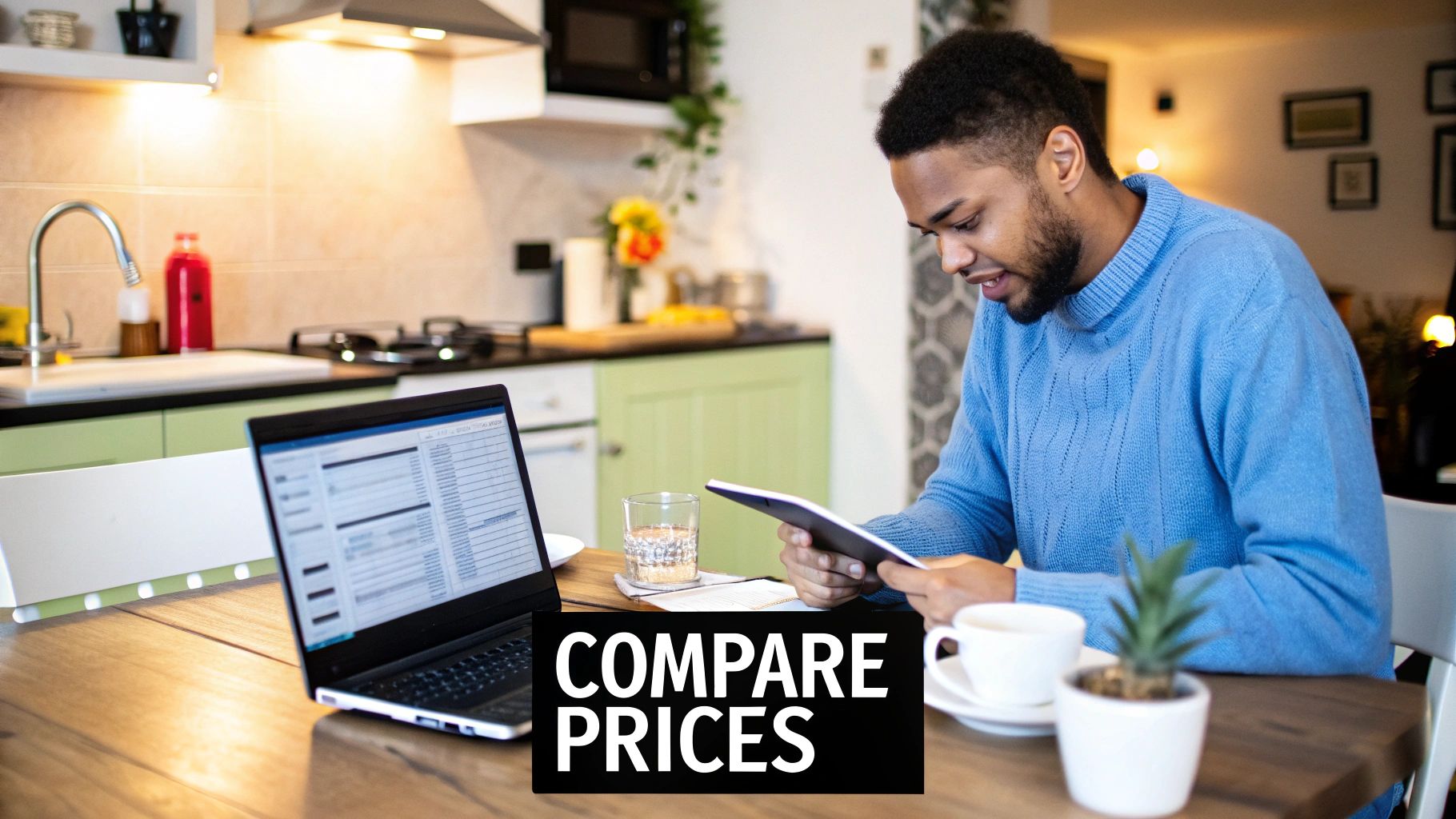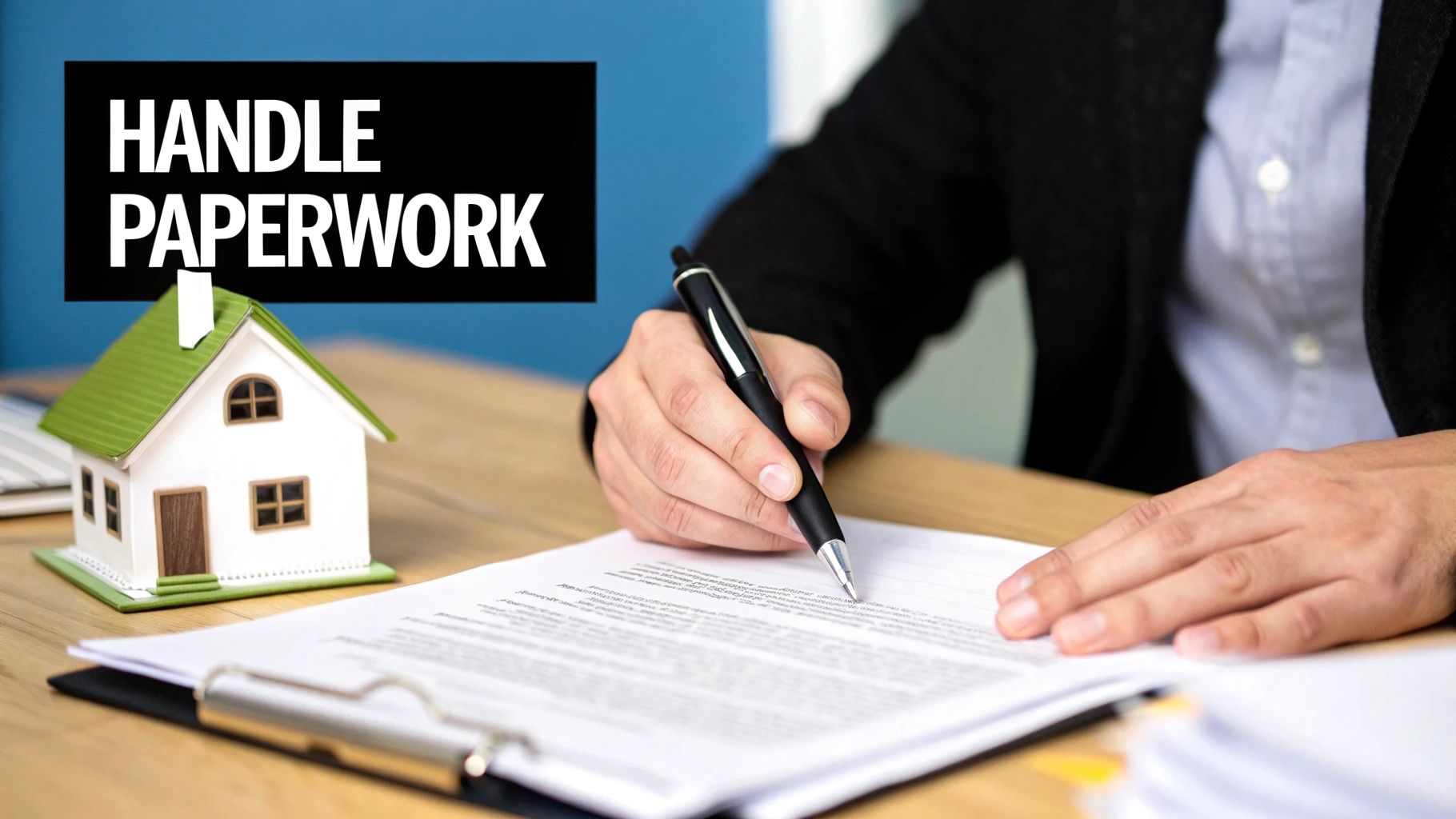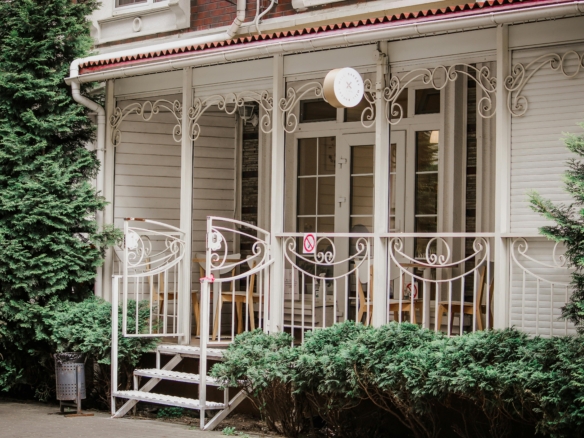Deciding to sell your house without a realtor is a significant move, usually driven by the desire to keep the 5-6% agent commission in your own pocket. This path, often called ‘For Sale By Owner’ or FSBO, isn’t just about saving money—it’s about taking full control of a complex transaction.
For savvy property owners and international investors, the real question is whether the potential savings are worth the substantial risk and effort involved. This guide will walk you through the process, from valuation to closing, ensuring you understand how to sell your house without a realtor in a competitive global market.
Is Selling Your House Yourself Worth It?
Let’s be clear: selling a house yourself means you are the agent. You’re responsible for everything from pricing and marketing to navigating complex legal paperwork and high-stakes negotiations. It’s a rewarding path for some, but recent data suggests it is becoming a less common one, particularly in developed markets like the USA and UK.
The market share of homes sold directly by owners has dropped to a historic low of just 6% of all home sales in the US. That’s a huge shift from 21% back in 1985. This trend hints that as property deals become more complex, especially those involving foreign buyers, most sellers recognise the value in professional representation.
Understanding The Trade-Offs
The main draw of going FSBO is obvious: avoiding the agent’s commission. On a high-value property in markets like London, Miami, or even emerging hotspots in South America, that can add up to a significant amount of cash. But that saving comes with a steep learning curve and a heavy workload. If you’re not careful, costly mistakes can easily wipe out any commission you might have saved.
Here are the key jobs you’ll be taking on:
- Pricing It Right: This is the most critical step. Price it too high, and your home will sit on the market collecting dust. Price it too low, and you’re leaving thousands on the table.
- Marketing Like a Pro: You’ll need to create a listing that grabs attention, hire a professional for high-quality photos, and get your property in front of the right buyers, including those from the USA and Europe.
- Handling the Legal Stuff: The web of contracts, disclosure forms, and local property laws can be a minefield. One wrong move here can have serious legal consequences.
- Negotiating the Best Deal: When an offer comes in, you need to be ready to negotiate like a seasoned professional. This includes the initial price, contingencies, and any repairs requested after the inspection.
Before you jump in, it’s helpful to see a direct comparison of what you’re signing up for.
FSBO vs Agent-Assisted Sale: A Quick Comparison
| Aspect | Selling Without a Realtor (FSBO) | Selling With a Realtor |
|---|---|---|
| Cost | No agent commission (save 5-6%). Pay for marketing, legal advice. | Pay 5-6% commission, split between buyer’s and seller’s agents. |
| Control | Full control over pricing, showings, and strategy. | Agent guides strategy and manages the process. Less direct control. |
| Time & Effort | Very high commitment. You handle all calls, showings, and paperwork. | Low time commitment. Agent handles marketing, scheduling, and admin. |
| Expertise | Rely on your own research for pricing, marketing, and legalities. | Access to professional market analysis, negotiation skills, and legal network. |
| Reach | Limited to platforms you use (e.g., local portals, social media, flat-fee MLS). | Full MLS exposure to all agents and their buyers, plus agent’s network. |
| Risk | Higher risk of pricing errors, legal mistakes, or poor negotiation outcomes. | Lower risk. Agent has insurance and experience to avoid common pitfalls. |
This table lays out the core differences. While going it alone gives you total control, it also puts all the responsibility squarely on your shoulders.

As the numbers suggest, while you can save on commission, the small slice of the market that succeeds with FSBO shows just how challenging it can be. Success requires airtight planning, from getting your home ready for viewings to managing the complex closing process.
Before you even think about listing, you need a solid game plan. A great place to start is our guide on the 10 ways to prepare your home for sale. This prep work is the foundation of any successful sale, whether you use an agent or not.
Ultimately, the choice to sell your house without a realtor comes down to your own market knowledge, how much time you can realistically commit, and your comfort level with risk.
Nailing Your Property Valuation and Pricing Strategy

When you decide to sell your house without a realtor, setting the right price is the single most important decision you will make. It’s a delicate balance. Price it right, and you attract serious buyers and set yourself up for a smooth negotiation. Get it wrong, and you either leave a pile of cash on the table or watch your property grow stale on the market.
Your best friend in this process is a Comparative Market Analysis (CMA). This is not about guesswork; it’s a data-driven method of comparing your home to recently sold properties that are as similar as possible. A quick tip: ignore the asking prices of homes currently for sale. What truly matters is the final price a buyer was willing to pay.
How to Run Your Own Market Analysis
To build a CMA that you can actually trust, you need to think like a local market analyst. Keep your search hyper-local, focusing on your specific neighbourhood or even your subdivision.
Hunt for “comps” (comparable properties) that have sold in the last three to six months and are a close match on these key points:
- Size: Stick to homes within 10-15% of your property’s square footage. Any larger a gap, and the comparison starts to fall apart.
- Age and Condition: This is where brutal honesty comes in. You cannot compare your home with its original 1980s kitchen to one that was just fully renovated.
- Key Features: Tally up the bedrooms, bathrooms, garage spaces, and lot sizes. Small differences matter.
- Location Specifics: Even within the same postcode, being on a busy main road versus a quiet cul-de-sac can dramatically alter a home’s value.
Once you have a solid list of three to five comps, it’s time to make adjustments. If a comparable home sold for €400,000 but had an extra bathroom you don’t, you need to adjust its value downward to align with your property. On the flip side, if you have a brand-new deck and they don’t, you adjust upward. This requires a level of objectivity that is absolutely essential when you sell your house without a realtor.
The Psychology Behind Pricing and Market Conditions
Pricing is as much about human psychology as it is about spreadsheets. An overpriced home is a massive red flag for buyers and their agents. It screams “unrealistic seller,” which can scare off potential offers before you even get a chance to negotiate.
Financially, FSBO home sales tend to result in significantly lower sale prices. The average sales price for FSBO homes was approximately $380,000, whereas homes sold with realtor assistance had an average sale price about $55,000 higher, at $435,000. This highlights the financial risk of inaccurate pricing and negotiation when selling independently.
To sidestep this common pitfall, get a handle on the current market’s temperature. A key metric is the absorption rate, which tells you how many months it would take to sell every home currently on the market. A low absorption rate means it’s a seller’s market, giving you more leverage on price. A high rate means it’s a buyer’s market, and you’ll need to be more competitive.
Factoring in Renovations and Commissions
Home improvements can certainly add value, but rarely dollar-for-dollar. Before you start knocking down walls, it’s smart to weigh the potential return on investment. For some great advice on this, check out these important pre-renovation considerations to make sure your money and effort actually boost your final sale price.
Finally, there’s one last critical piece of the pricing puzzle: the buyer’s agent commission. You’re saving money by not hiring a listing agent, but the overwhelming majority of buyers, especially those from overseas, will have an agent representing them.
If you want to tap into this massive pool of potential buyers, you need to be prepared to pay their agent’s commission, which is typically 2.5-3% of the sale price. Make sure you build this cost into your net proceeds calculation and state clearly in your listing that you are “willing to cooperate with buyer’s agents.” Skipping this step is a classic FSBO mistake that severely limits your home’s exposure and can sabotage your entire sale.
Crafting a Marketing Plan to Attract Global Buyers

When you go the For Sale By Owner (FSBO) route, you’re taking on the marketing yourself. This is where many sellers stumble. Without an agent’s network, your strategy needs to be sharp enough to not just find buyers, but to capture the attention of a global audience.
Your goal is to present a polished, move-in-ready property that speaks to international investors and homebuyers who might only ever see it online.
This process starts way before you snap the first photo. It begins with aggressive decluttering and depersonalising. A buyer from overseas needs to imagine their life in your home, not get distracted by your family photos or personal knick-knacks. Think of it as creating a blank canvas.
Professional staging isn’t just a nice-to-have; it’s a critical investment in the FSBO world. A well-staged home looks infinitely better in photos and virtual tours, which is your primary bait for catching a foreign buyer’s eye. You’re not just selling a house; you’re selling an aspirational lifestyle.
Creating Your Core Marketing Assets
With the stage set, it’s time to capture your home’s best features. In today’s market, fuzzy smartphone pictures are an instant turn-off and will get your listing ignored.
Your visual package is your storefront. Make sure it includes:
- High-Resolution Photography: This is non-negotiable. Hire a professional real estate photographer who knows how to use lighting and angles to make every room feel spacious and inviting. Market data shows that 41% of buyers find professional photos extremely useful when searching online.
- Detailed Floor Plans: International buyers often cannot just pop over for a quick look. Floor plans are essential for them to understand the property’s layout, flow, and dimensions from thousands of miles away.
- Immersive Virtual Tours: A quality 3D tour or a well-shot video walkthrough is your 24/7 open house. It lets a potential buyer in London or Singapore “walk” through your property, building the confidence they need to make a serious inquiry.
Once the visuals are locked in, you need a compelling story. Your listing description should do more than just list the number of bedrooms and bathrooms. Tell the reader what it feels like to live there. Mention the morning sun flooding the kitchen, the short walk to a renowned international school, or the quiet evenings on the balcony. Write for your ideal buyer—whether that’s a family from the USA seeking a holiday home in Portugal or an investor from Brazil adding a Miami condo to their portfolio.
Choosing Your Marketing Channels
With your marketing assets ready, it’s time to get them in front of the right people. A multi-channel approach is the only way to ensure you’re reaching a wide net of qualified buyers.
Your strategy should blend digital platforms with a few old-school methods:
- International Property Portals: This is your heavy hitter. Listing on a global platform like Homesgofast.com instantly exposes your property to buyers from over 50 countries. These sites are specifically designed to connect private sellers with international investors.
- Social Media Advertising: Don’t just post and pray. Use Facebook and Instagram to run highly targeted ad campaigns. You can zero in on specific demographics, wealthy postcodes in cities like New York or Dubai, and even interests like “luxury travel” or “real estate investing.”
- The Humble ‘For Sale’ Board: Never underestimate the power of a professional “For Sale” board. It alerts the neighbourhood, catches the eye of local buyers’ agents, and signals that your property is on the market.
- Open Houses: A well-promoted open house can create a sense of urgency and buzz. For any international buyers who happen to be in town, it’s their one chance to see the property in person and get their questions answered.
Responding to inquiries and managing viewings requires a professional touch. Be prompt and courteous with every message. For safety, try to vet potential viewers beforehand if possible. During the showing, act as a knowledgeable and welcoming host, but give them space to look around. Let the property do the selling. A great viewing experience can be the final push a buyer needs to make an offer.
Navigating Legal Paperwork and Disclosures
When you decide to sell your house without a realtor, there’s one area where you absolutely cannot afford to cut corners: the legal paperwork. This isn’t just about filling in some blanks. It’s about protecting yourself from future liability and making sure the transfer of your most valuable asset is completely airtight.
One small mistake here can unravel your entire deal. Worse, it could lead to expensive legal battles long after you’ve handed over the keys. The sheer volume of documents can feel overwhelming, from the initial sales contract to the final closing statements.
If you’re selling to an international buyer, the complexity can multiply. Buyers from the USA, Europe, or South America often come with different expectations and legal customs. Clear, professionally prepared documentation is your best friend in these scenarios.
Getting The Paperwork Right
Let’s be clear: while selling your home yourself can save you on commissions, the legal side is where you need to invest. A misstep here is not just an inconvenience; it can be a financial catastrophe.
The table below breaks down the essential legal documents you’ll likely encounter. While specific requirements vary by country, state, or even city, this checklist covers the foundational paperwork for most property sales.
Essential Legal Document Checklist For FSBO Sellers
| Document/Disclosure | Purpose | When It Is Needed |
|---|---|---|
| Sales Contract / Purchase Agreement | The core legal document that outlines price, dates, contingencies, and all terms of the sale. | After a verbal offer is accepted, to make the deal legally binding. |
| Property Disclosure Statement | A form where you disclose all known material defects with the property (e.g., leaky roof, foundation issues). | Provided to the buyer before or during the offer stage for their review. |
| Lead-Based Paint Disclosure | A mandatory federal form in the U.S. for any home built before 1978. | Must be given to the buyer before they are obligated under any contract. |
| Title Report | A document showing the legal status of the property’s title, including any liens or encumbrances. | Ordered after the contract is signed, reviewed by the buyer and their lender. |
| Closing Statement (HUD-1/ALTA) | A detailed list of all charges and credits for both the buyer and seller in the transaction. | Provided just before closing for final review and signature. |
| Deed | The legal instrument that officially transfers ownership of the property from you to the buyer. | Signed at closing and recorded with the local government authority. |
Failing to provide the right disclosures is one of the fastest ways to land in legal trouble. It can give the buyer an easy way out of the contract or, worse, grounds for a lawsuit after the sale. This is precisely why professional oversight is non-negotiable.
Your Most Important Hire: A Real Estate Solicitor
This leads to the single most critical piece of advice for any FSBO seller: hire a real estate solicitor or conveyancer from the very start.
Yes, it’s an upfront cost. But think of it as an investment in security and peace of mind. A good solicitor does more than just glance over forms. They will:
- Draft an ironclad sales contract tailored to your property.
- Guide you through all mandatory local and national disclosures.
- Help you understand and negotiate contract contingencies.
“When selling to international buyers, legal oversight is not just advisable; it’s essential. Different jurisdictions have vastly different expectations for due diligence and contract law. A solicitor acts as your expert guide, ensuring the transaction is compliant not just locally, but is also structured to be clear and secure for a foreign buyer.”
— Nick Marr, Founder of Homesgofast.com
Understanding and Managing Contingencies
It’s almost a guarantee that your buyer’s offer will come with contingencies. These are simply clauses that allow them to back out of the deal if certain conditions aren’t met.
The most common ones you’ll see are the financing contingency (if the buyer can’t get a mortgage) and the inspection contingency (if the home inspection reveals major problems).
Your solicitor is your best ally here. They will help you negotiate these terms, setting firm deadlines and clearly defining what qualifies as a “major issue.” This simple step prevents a buyer from using a small, insignificant repair as an excuse to walk away, protecting your sale from falling apart over nothing.
Handling Negotiations and the Closing Process

This is it—the final stretch. Successfully negotiating an offer and steering the deal through to closing are the last hurdles in your FSBO journey. All your hard work comes down to this, where a promising offer becomes a closed sale and money in the bank.
When that first offer comes in, your eyes will naturally jump to the price. Fight that urge. A high offer tangled up in messy contingencies can be a nightmare compared to a slightly lower, cleaner deal. You have to look at the entire package with a cool, business-like perspective.
Evaluating and Responding to Offers
A great offer is much more than just the number. It’s the sum of all its parts, and your job is to figure out how well those parts work for you. When you get an offer, whether it’s from a local family or an international investor, break it down immediately.
Here’s what I always look at first:
- The Price: Does it align with your own data-backed valuation?
- Financing: Is it a cash offer, or is it contingent on the buyer getting a mortgage? Cash is king because it’s faster and less likely to fall through.
- Contingencies: Get a magnifying glass out for inspection, financing, and appraisal contingencies. The shorter these timelines, the better it is for you.
- Proposed Closing Date: Does their timeline fit with your moving plans? Being flexible on the date can be a great bargaining chip.
- Earnest Money Deposit: A bigger deposit is a clear sign of a serious, committed buyer.
Once you’ve dissected the offer, you can put together a smart counter-offer. Keep emotion out of it. This is a business decision. You can adjust the price, tighten up timelines, or tweak other terms to shift the deal in your favour.
Managing Post-Inspection Negotiations
The home inspection is a classic friction point where a good deal can go sideways. Buyers will almost always come back with a list of requested repairs or credits based on what their inspector found. The key is to separate the real issues—like structural or safety problems—from minor, cosmetic fixes.
Your solicitor is your best friend here. They’ll help you draft a response that addresses legitimate concerns without giving away the farm. And remember, everything is negotiable. Offering a credit at closing instead of doing the repairs yourself is often a cleaner, faster solution for everyone.
The current market can really complicate things. According to Knight Frank’s latest Global House Price Index, while price growth is moderating, certain prime markets continue to see strong demand from affluent international buyers. In a hot market with low inventory, sharp negotiation skills are absolutely essential. Explore more detailed real estate statistics and trends on Fixr.com to understand the dynamics at play.
Navigating the Final Closing Steps
Once you have a solid, contingency-free agreement, the formal closing process kicks off. This is where a neutral third party—usually a title company or a real estate solicitor—steps in to make sure all the legal and financial boxes are ticked before the property officially changes hands.
Here’s a quick rundown of what to expect in the home stretch:
- Title Search: The closing agent will run a deep check to ensure there are no hidden liens or claims on the property. This confirms you have the clear legal right to sell.
- Document Preparation: All the final paperwork, like the deed and the official closing statements (such as the ALTA or HUD-1), will be drawn up for you and the buyer to sign.
- Final Walkthrough: The buyer will usually do a final walkthrough 24-48 hours before closing to make sure the house is in the condition you both agreed on.
- The Closing Appointment: This is the finish line. It’s the final meeting where everyone signs the documents, the funds are officially transferred, and you hand over the keys.
Getting through these final steps successfully is a huge accomplishment. It takes focus, a steady hand during negotiations, and trusting your legal counsel to wrap everything up smoothly. Congratulations—you’ve sold your house.
Frequently Asked Questions About Selling a House Yourself
Deciding to sell your own property is a big step, and it naturally comes with many questions. When you skip the traditional estate agent, you take on everything from legal checks to marketing. To help you feel more confident, we’ve tackled some of the most common queries from homeowners just like you.
What Is the Biggest Mistake to Avoid When Selling a House Without a Realtor?
The single costliest mistake you can make is getting the price wrong. Your asking price sets the tone for the entire sale, and nailing it from day one is everything.
So many sellers fall into the trap of overpricing, usually because of an emotional attachment to their home or just not doing enough research. A home priced too high will just sit there. Serious buyers and their agents will scroll right past it, assuming you are not a serious seller.
When a property lingers on the market, it goes “stale,” and you will eventually have to make significant price cuts. Ironically, this often means you end up selling for less than if you had priced it correctly from the start. On the flip side, underpricing is just as bad—you might get a quick sale, but you are leaving a pile of cash on the table.
The only way to avoid this is with a solid comparative market analysis (CMA). This isn’t a quick glance at Zillow; it’s a deep dive into recently sold homes in your immediate area that are genuinely similar in size, age, condition, and features. You have to be brutally objective and see your home through a buyer’s eyes. If you’re at all unsure, paying for a professional appraisal before you list is a smart investment that gives you an unbiased, expert valuation.
How Do I Handle the Buyer’s Agent and Their Commission?
Even if you’re selling on your own, your buyer will almost certainly have an agent. This means you need to be prepared to work with them professionally—they are a key part of getting the deal done.
In most property markets around the world, it’s standard for the seller to pay the buyer’s agent’s commission. This typically runs between 2.5% to 3% of the final sale price. Make sure you advertise this clearly in your listing. Stating that you are offering a “buyer’s agent commission” (or BAC) is a green light for agents to bring their clients to your door, massively expanding your pool of potential buyers.
Trying to sidestep this commission is a huge mistake. You will effectively cut yourself off from the vast majority of the market. Agents need to make a living, and they aren’t going to waste time showing properties where they won’t get paid. When an agent brings you a qualified buyer, treat them like a partner. They help coordinate everything from inspections to appraisals and are instrumental in making sure the sale actually closes.
What Are the Most Effective Ways to Market My FSBO Property?
You cannot just rely on one channel; you need a professional, far-reaching marketing plan to capture both local and international attention.
- Professional Visuals Are Non-Negotiable: First things first, hire a professional photographer. In today’s market, blurry smartphone photos just won’t cut it. You also need a detailed floor plan and, ideally, an immersive virtual tour. Think of these as your 24/7 open house, especially for overseas buyers who cannot just pop over for a viewing.
- Get on the Big Listing Sites: Your main tools will be online property portals. To get maximum exposure, list on major domestic sites and international platforms like Homesgofast.com, which is built to connect sellers with a global audience of homebuyers and investors.
- Use a Flat-Fee MLS Service: This is a must-do investment. A flat-fee service gets your home onto the Multiple Listing Service (MLS), which is the primary database that nearly every real estate agent uses to find homes for their clients. Without an MLS listing, you are invisible to a massive chunk of the market.
- Don’t Forget the Classics: A professional ‘For Sale’ board in your yard still works wonders. You should also share your listing across your social media networks and even consider running targeted ads on platforms like Facebook to reach specific buyer demographics in key international locations.
Do I Really Need a Solicitor if I Am Selling by Owner?
Yes. Absolutely. There is no grey area here. While you’re saving money on an agent’s commission, trying to cut costs by skipping legal advice is a gamble you cannot afford to take. The financial and legal fallout can be devastating.
A real estate solicitor (or conveyancer) is the most critical professional on your team when you sell by owner. They do far more than just look over a few documents; they are there to protect your interests from start to finish.
A solicitor will draft or review the purchase agreement to ensure it is legally sound, help you navigate complex buyer contingencies, ensure all necessary property disclosures are correctly handled to prevent future lawsuits, and verify all closing documents for accuracy.
Property law is incredibly complex and varies from one country to another, and even between local areas. A legal expert ensures your sale is airtight and fully compliant with all rules and regulations. This is especially true if you’re dealing with an international buyer, where different legal systems can make things even more complicated.
For more on getting every aspect of your property ready for market, check out our guide on how to prepare your home for a quick and profitable sale, because being legally prepared is a huge part of the process.
About Homesgofast.com
HomesGoFast.com is a leading international property website, established in 2002, helping homeowners, real estate agents, and developers reach overseas buyers. Featuring thousands of listings from over 50 countries, the platform connects global property seekers with homes, apartments, villas, and investment opportunities worldwide.
Looking for expert mortgage guidance? Get international property mortgage advice here:
👉 https://homesgofast.com/mortgages-overseas/
Explore more overseas homes for sale at our global partner site:
👉 https://homesgofast.com/overseas-property/
Looking to sell real estate to foreign buyers
https://homesgofast.com/sell-overseas-property/




